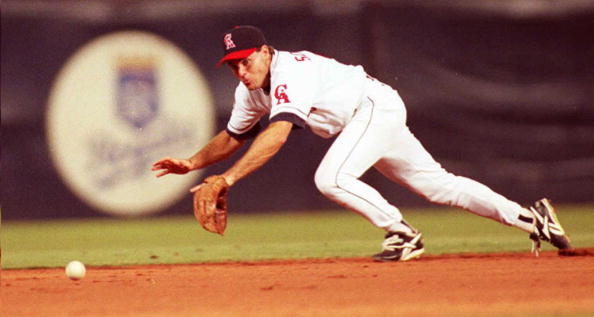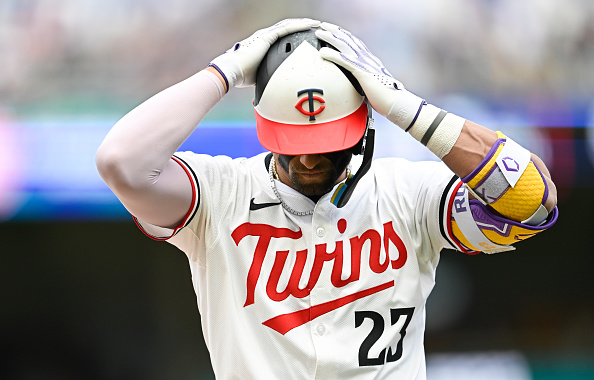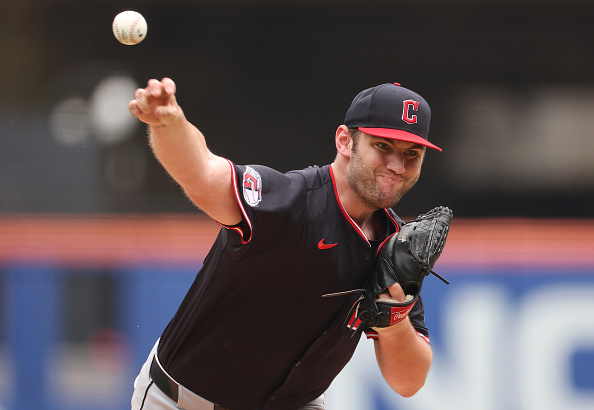As the 2021 Angels full squads report to Tempe, Arizona celebrating their first 60 seasons, we’re beginning the season off right. Celebrating the top sixty players in franchise history.
This list has been compiled based on an unbiased HaloLife formula. It utilizes account Fangraphs & Baseball-Reference WAR ratings, awards voting, All-Star, and post-season appearances, among other factors. These rankings are strictly based on their performance during every player’s Angels’ career. The list does not reflect overall career performance or play with other teams, or the personal preferences of the author.
You can read the previous list of player rankings 56-60, 51-55, and 46-50 here.
This week we countdown the 41st through 45th greatest Angels of all-time.
45. Chili Davis
Charles Theodore Davis was a two-time National League All-Star after seven seasons with the San Francisco Giants. In December 1987 that changed when he signed a one-year, $810,000 contract to play for the Angels. His signing was big, ending a five-year hiatus from major free agent signings.
The switch-hitting outfielder known as Chili provided the Angels lineup a much-needed presence in the middle of their batting order. He provided needed protection for gap hitters like Wally Joyner and Johnny Ray at the top. He immediately made an impact, hitting over 20 home runs and driving in 90 or more runs his first two years in Anaheim. Injuries would plague his 1990 season, limiting him to only 17 doubles and 12 home runs.
Davis would leave for Minnesota as a free agent in 1991 and help lead the Twins to their second World Series championship. The switch-hitter contributed to the Twins offense with two home runs in the Fall Classic. He would return to the Angels following two seasons in Minneapolis and play four more seasons for California. This time, providing consistent offensive production as a designated hitter in a line-up of younger talent.
Davis would hit 27 home runs and a career-best 112 runs batted in during his first season back in Anaheim. Following up that year by hitting .311 and making the All-Star squad for the 1994 Angels. He would hit a career-high .318 in 1995 and complete his tenure with the franchise after the 1996 season. He finished up this tenure tabulating a .279 average, 156 home runs, and 618 runs batted in.
44. Albie Pearson
The 5-foot-5 outfielder spent the first three seasons of his career with Washington and Baltimore before being the Angels’ fourth pick in the expansion draft. The diminutive Pearson would instantly become a fan favorite for the inaugural Los Angeles Angels team. Entertaining fans playing their home games at the old Pacific Coast League’s Wrigley Field.
The 1958 American League Rookie of the Year, would hit .288 for that 1961 Angels club. On April 11th of that inaugural season, he’d bat third in their first regular-season game. Pearson reached base on a walk in the first inning becoming the first in franchise history to reach base. A few minutes later, he would become the first to score a run when the next batter, Ted Kluszewski, homered. Pearson finished that first game in Halos history victorious, going 1-for-3 with two runs scored.
His 115 runs scored in 1962 would lead all American League hitters. His finest season would follow in 1963, hitting .304 with .402 on-base and stealing 17 bases for the organization. Pearson would make his lone career All-Star appearance in 1964. That same year he would finish 14th in the AL Most Valuable Player voting. Pearson would wrap up his playing career in 1966 as one of the most beloved Angels in franchise history.
43. Scot Shields
Shields’ durability out of the bullpen was unlike many contemporaries of his era. He was often referred to as a “rubber armed” pitcher for his ability to pitch multiple innings with limited rest. A 38th round selection in the 1997 MLB draft, the lanky right-hander rose through the farm system as a starting pitcher. It was as a valuable middle reliever, that he would find his place on the Angels pitching staff.
Shields would spend his rookie season as a member of the 2002 World Series champion Angels roster. Appearing in 29 games during the regular seasons but only getting the call during one game in October. His role would increase significantly the following season. In 2003 he pitched 148 innings in 44 games, making 13 starts for the Halos. In the next two seasons of 2004 and 2005, he would pitch 105 and 91 innings in 60 and 78 games respectively. Providing valuable, quality, multiple inning outings for a perennial playoff contender throughout the decade.
For six straight seasons, the Michigan native would pitch a minimum of 60 innings of relief each season holding games for closers Troy Percival and Francisco Rodriguez. Shields would finish his career playing entirely with the Angels organization. Accumulating a 3.18 ERA across 491 games (15 starts) holding 155 games while saving 21 himself. The reliever also provided the Angels solid post-season performances with 3.20 ERA, striking out 25 hitters in 25 innings across six October series.
42. Maicer Izturis
When compiling the greatest 60 players in franchise history, you don’t immediately think of utility infielders making the grade. Mighty Maicer Izturis was viewed by many as a utility infielder. Filling in the holes of starting second basemen, shortstops, and third basemen of his tenure in Anaheim. The younger brother of former Dodger infielder Cesar Izturis was more than just an extra infielder. The younger Maicer performed at the level of a starter at those positions when called upon.
During his eight seasons with the Angels, Izturis appeared in 759 regular-season games. When called upon, he’d hit .276 with 141 doubles, and stealing 87 bases. In 2006, he would find the closest thing to a regular starting job during his career as he started 78 games at third base. Izturis would hit as high as .300, compile as many as 35 doubles, and steal 17 bases in a season in Anaheim.
Splitting his time almost equally between three infield positions, the 5-foot-8, 185-pound infielder would provide solid defense, great base-running, and incredible versatility. Leading to much success for a perennial playoff team during the decade of the 2000s. The Angels were clearly spoiled by the performance of the infielder. The lack of his presence and versatility was missed by the franchise most of the decade following his career.
41. Dick Schofield
One of the biggest prospects in the first half of the Angels’ 60-year history. Dick Schofield was looked to be the heir apparent at shortstop for Rick Burleson. The 19-year-old prospect hit .330, 28 doubles, 14 home runs, and 23 stolen bases in the 1982 minor league season. The elite farm hand would hit .283 at Triple-A Edmonton in 1983 before getting his first call to the Angels at 20-years-old. While the young infielder’s glove made an immediate impact in the majors, his offensive performance never lived up to expectation.
By his age-25 season, the son of MLB veteran Dick “Ducky” Schofield, had already appeared in over 700 MLB games at shortstop. He had established himself as one of the premier defensive middle infielders in baseball. Schofield’s best season would come in 1986 when he hit .249 with career-high 13 home runs and 23 stolen bases. The most memorable moment coming the evening of August 29, 1986. With the Angels trailing the visiting Detroit Tigers by seven runs heading into the ninth, Schofield would cap off the inning with a walk-off, grand slam versus Tigers closer Willie Hernandez. The win further propelling the Angels to clinch their third AL West Division title a few weeks later.
Schofield would be traded to the Mets during the 1992 season. He’d return for a swan song playing his final two seasons with Angels 1995 and 1996. Across his 12 seasons in Anaheim, he would play 1,086 games with the organization. He’d hit .230, 137 doubles, 120 stolen bases, and have a 10.7 defensive WAR that is the sixth-best all-time among Halos.
We will next countdown the 36th through 40th greatest Angels all-time. A group featuring Gold Glove defensive wizards and one of their best free-agent pitcher signings.
Check us out on our socials:
Twitter: @PTSTNews and @TalkPrimeTime
Facebook Page: Prime Time Sports Talk
Join our Facebook Group: Prime Time Sports Talk
Instagram: @ptsportstalk
Follow B.J. Martin on Twitter @_HaloLife
Main Image Credit: Embed from Getty Images







